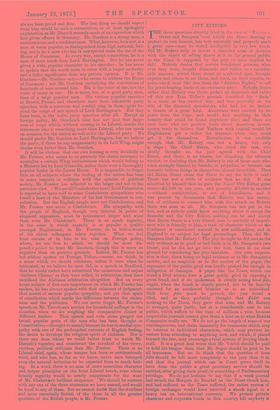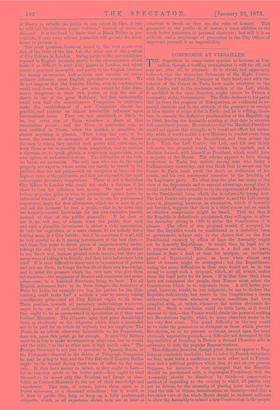CITY EDITORS.
THE three questions directly tried in the case of Rubery x. Grant and Sampson "—of which the Times, desiring to protect its own honour, has very naturally and properly made a great case—may be stated intelligibly in very few words. Did Mr. Rubery help to invent a diamond mine in Arizona with the object of selling shares in it• to the general public, as the Times is supposed by the jury to have implied he did? Nobody denies that certain fraudulent persons, who- ever they were, bought diamonds and rubies to a consider- able amount, sowed them about at a selected spot, brought experts and others to see them, and tried, on their reports, re- ports which read like bits from the "Arabian Nights," to sell the jewel-bearing lands at an enormous price. Nobody denies either that Rubery was there, picked up diamonds and rubies off this new Tom Tidler's ground, described his " finds " in a more or less excited way, and was generally on the side of the diamond speculators, who had for an instant a chance of a great haul. Americans were excited by re- ports from the Cape, and would find anything in their country that could be found anywhere else ; and there are men here who are positive fools about American invest- ments, ready to believe that Yankees with capital would let Englishmen get a dollar for sixpence when they could get it for themselves. Nevertheless, it was credible enough that Mr. Rubery was not a knave, but only a dupe ; the Chief Baron, who tried the ease, evi- dently thought so, the jury agreed with the Chief Baron, and there is no reason for disputing the ultimate verdict, or doubting that Mr. Rubery is one of those men who, when strongly biassed by friends, or prejudice, or interest, can honestly believe things in themselves almost incredible. Then did Baron Grant cause the Times to say the little it said? There was not a tittle of evidence that he did. It was admitted by himself that he gave the Times' City Editor great sums—£2,500 in one year, and possibly £5,000 in another —without consideration, or out of friendliness, and it was proved by documents that Rubery was his enemy, but of evidence to connect him with the attack on Rubery there was none at all. Mr. Sampson was not put in the box, and as nobody could know anything about it except the financier and the City Editor, nothing can be said except that Baron Grant is a very liberal man to anybody of import- ance who is friendly to him, a trait of character which on the Continent is considered natural in new millionaires, and in England is no subject for legal proceedings. Then did Mr. Sampson libel Mr. Rubery ? The jury thought he did, and as the only evidence as to good or bad faith is in Mr. Sampson's own breast, and he did not go into the box, there is no clear ground for considering the jury mistaken. Our own impress- sion is that, there being no legal evidence as to Mr. Sampson's motive, and no suspicion as to the motive of the paper, the argument of the public good was hardly pushed far enough in mitigation of damages. A paper like the Times, which can stand a libel action, does a great public good in exposing a great fraud, and if its spokesman is clearly acting bond fide, ought, when the fraud is clearly proved, not to be heavily amerced for an accidental blunder as to an individual. Still bona fides must be proved, the jury found a libel, and as they probably thought that £500 was nothing to the Times, they gave that sum, and Mr. Rubery is avenged, quite justly, but at a considerable cost to the public, which suffers to the tune of millions a year, because respectable journals cannot give them a hint as to what Bubble Companies really are. We do not go the length of some of our contemporaries, and claim immunity for comments which may be ruinous to individual characters, which may prevent in- vestors from attending to anything new, and which, if placed beyond the law, may encourage a fatal system of levying black- mail. It is a great deal worse that Mr, Vitriol should be paid to hold his tongue than that Mr. Sugar should be paid to be all innocence. But we do think that the question of bona fides should be left more completely to the jury than it is, and that the journal which can in Court prove itself to have done the public a great pecuniary service should be entitled, after giving such proof, to something of Parliamentary privilege. We do not hesitate to say that if a weak journal had struck the Marquis de Bourbel as the Times struck him, and had suffered as the Times suffered, the entire system of foreign exchanges would have received a shock equal to a heavy tax on international currency. We protect private character and corporate funds in this country till anybody is
at liberty to swindle the public to any extent he likes, if only he will call his rubbishy paper "shares," instead of notes on demand. It is too hard to know that a Black Friday is pre- ventible, if only some solvent journalist will go into the work- house to prevent it.
The great question, however, raised by the trial is not even this of the state of the law, but the other one of the position of City Editors in London. Owing partly to the just confidence reposed in English journals' partly to the circumstances which make it so difficult to start daily papers in London, and which create a practical monopoly, and partly to the English fondness for daring investment, half-a-dozen men exercise an extra- ordinary influence upon English speculative commerce. We do not suppose that the London Dailies, even in combination, could send down Consols five per cent. except by false state- ments dangerous to their own power, or stop the sale of shares in one of the great Railways ; but they undoubtedly could ruin half the miscellaneous Companies in existence, make the establishment of new Companies almost im- possible, and exercise an almost irresistible influence upon international loans. They are not combined, or likely to be, but every one of them exercises a share of that tremendous power ; and the Times in particular can, as was testified in Court, when the market is sensitive, do almost anything it pleases. That being the case, it be- hoves the owners or managers of those journals to choose the men to whom they entrust such power with extra care, to keep them as far as possible from temptation, and to exercise a rigorous, or, to speak plainly, a suspicious supervision, even over agents of undoubted honour. The difficulties of the task, we know, are enormous. The only men who can do the work properly are experts, whose action can hardly be traced by the public ; they are not paid—with an exception or two—at the highest rates of the profession, and they are exposed to the most extravagant pecuniary temptations. There is not a first-class City Editor in London who could not make a fortune if he chose to turn his influence into money. He need not take bribes, or pocket gifts, or even be guaranteed against losses by influential friends. All he need do is, to use his professional experience, apply for first allotments, which he is sure to get, and sell the moment he sees a profit,—that is, he need only use honestly-earned knowledge for his own exclusive benefit, instead of that of the public generally. If he does so use it, he will not, of course, warn the public that such and such a plausible investment is either a risky speculation, fit only for capitalists, or a mere chance, fit for nobody but a betting man, or a City bubble ; but if he mentions it at all, will be very careful to do it among investments of the best class,— and from that point to direct praise of unpraiseworthy under- takings the step is very short indeed. It is very seldom taken in any direct way, because printed words remain; but there are many ways of taking it indirectly, and they have before now been tried. It is most difficult to many men to be conscious of powers and not use them, to forego the benefit of their own knowledge, and to resist the pressure which the very men who give them information—the magnates of finance and commerce and enter- prise---can, in a hundred directions, bring to bear. Yet all English statesmen have to do these things—the Secretary of -State for India, for example (we beg his pardon for the illus- tration), could make half a million a year by merely taking ,conciliatory gifts—and all City Editors ought to do them. 'Their position towards all pecuniary undertakings whatever, -ought to be one of cool, unbiassed, painstaking criticism, and they ought to be as unconcerned in speculation as if they were Cabinet Ministers. The etiquette upon that point should bind them as absolutely as the etiquette which binds a journalist not to be paid for an article by anybody but his employer. The Times, in an article otherwise honourable to its Proprietary, does not, upon this point, go far enough. It says City Editors must be as free to make investments as other men, but we would add the rider, " as free as other men in high public office." The Foreign Secretary is not free to speculate in Spanish Bonds, or the Postmaster-General in the shares of Telegraph Companies he may be going to buy, and the City Editors of London Dailies ought to be bound during their term of office by the same rule. If they have money to invest, as they ought to have— for no function needs to be better paid—they ought to bind themselves to invest only like Trustees, and forego as abso- lutely as Cabinet Ministers do the use of their knowledge and experience. That rule, of course, leaves them open, as it leaves statesmen, to a thousand seductions ; but it would, as it does in public life, help to keep up a lofty professional .etiquette, which, as all experience shows, men are at least as
reluctant to break as they are the rules of honour. This guarantee to the public is, of course, a mere addition to the much better guarantee of personal character; but still it is an addition, and a surplusage of precaution in the City Offices of important journals is an impossibility.







































 Previous page
Previous page